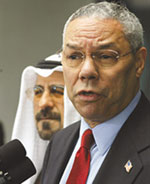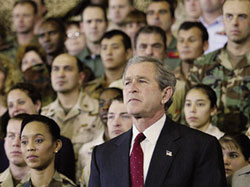UN weapons inspector Hans Blix: ‘U.S. planned Iraq war in advance’

The Bush administration begins rattling saber at Iraq’s neighbors
NEW YORK (FinalCall.com)–The Syrian government of President Bashar Assad faced renewed warnings from American officials not to provide safe haven for senior figures in Saddam Hussein’s regime. At Final Call press time, U.S. Secretary of State Colin Powell raised the possibility of diplomatic and economic sanctions while speaking at a State Department press conference.
“Syria should review their behavior, not only with respect to who gets haven in Syria and the issue of weapons of mass destruction, but most importantly on the support of terrorist activity,” Mr. Powell said.
In a parallel statement, National Security Adviser Condoleezza Rice took her turn at the government in Damascus, saying: “Syria’s support for terrorists and harboring the remnants of the Iraqi regime are unacceptable.” But, Ms. Rice said no American military action was on the front burner at this time.
White House spokesman Ari Fleischer called the Muslim nation a “rogue state” during an April 14 press briefing in Washington.
“It is clear that Israel is behind this Washington rhetoric,” Syrian Deputy U.N. Ambassador Fayssal Mekdad told The Final Call. “For 30 years we hosted the Iraqi opposition, but we have stood with the Iraqi people against the occupation, which has killed innocent Iraqis.”

Ambassador Mekdad noted that Syria served on the Security Council, and that there was no permission for the United States to start the war with Iraq.
“The United States has a huge stockpile of chemical weapons, and yet they turn away from international conventions that control such weapons. Syria has always been a partner in the international community,” Mr. Mekdad said, asking, “How many international instruments has Israel turned its back on?”
“I do not think the American people would allow Pres. Bush to attack Syria,” Mr. Mekdad said.
When reporters asked whether American forces would now turn their sights on Syria, President Bush replied: “They just need to cooperate.” But observers say that Pres. Bush’s sharp criticism of Syria has also focused attention on the implications of the war for American foreign policy.
The Brookings Institute, a think-tank in Washington, has suggested that control of Iraq can affect Syrian and Iranian sponsorship of the organization Hezbollah, both geographically and politically.
“The United States must make it clear quietly and publicly that Syria may come to an end if it does not stop its support of Hezbollah,” a Brookings position paper said.
But there are some Washington insiders who believe that it would be insane to attack Syria. Lawrence Eagleburgher, who was Secretary of State under George Herbert Walker Bush, told the BBC: “If George Bush [Jr.] decided he was going to turn the troops loose on Syria and Iran, after that he would last in office for about 15 minutes. In fact, if President Bush were to try that now, even I would think that he ought to be impeached. You can’t get away with that in a democracy.”
There are few analysts who believe that the administration wants to attack Damascus, but reports surfaced on April 10 that the Pentagon was drawing up contingency plans. Furthermore, the hawks in the administration were arguing that the regional balance of power had shifted to Washington and Israel as a result of the Iraqi war.
“There will have to be change in Syria,” Deputy Defense Secretary Paul Wolfowitz said on April 10.
“The United States would be compelled to act against Syria if it was found out that weapons of mass destruction had been moved there by Saddam Hussein’s fallen Iraqi regime,” said Pentagon adviser Richard Perle on April 12. Mr. Perle and Mr. Wolfowitz were key agitators in the war against Iraq.
Senior Pentagon officials have said that no evidence has been found that Iraq smuggled chemical weapons into Syria. They did say that it was possible a few Iraqi scientists fled there.
“I do not think that the U.S. can take another war right now,” Michael Ratner, president of the New York-based Center for Constitutional Rights told The Final Call during an exclusive interview at UN headquarters. “But, I caution Syria’s President Assad not to underestimate the American propaganda machine. They have already given about five reasons to attack the Syrians, and the half-dozen people advising Pres. Bush have wanted to do this since 1991,” Mr. Ratner said.
William Kristol and Lawrence Kaplan, in their book,”War Over Iraq,” argue for a course of action that observers say has come to be seen by many outside America as the course of U.S. foreign policy after Iraq.
Mr. Kristol is the founder of the Project for the New American Century, a conservative think-tank, and an architect of the new aggressive U.S. foreign policy. Mr. Kaplan is a senior editor at the New Republic magazine.
Iraq is but the first act in a multipart drama in which the U.S. confronts the “despots” and “failing” states around the world that threaten its security.
Pres. Bush has laid out his doctrine of pre-emption, warning governments everywhere that the U.S. will not tolerate challenges to its power and will root out threats from weapons of mass destruction. His January 2002 State of the Union speech identified the “axis of evil” as the principal candidates for regime change, observers have said.

“Syria is still a big question mark. It could easily be Cuba next, or Haiti, or the Andean region; the administration surely has problems with the regime in Venezuela,” Roger Normand, executive director of the Brooklyn-based Center for Economic and Social Rights told The Final Call. “I cannot see the administration following the Iraqi war with another big war, and Syria would be a big war,” Mr. Normand stressed.
But, an article in the London Observer on April 13 suggests that there is an immediate political reason shaping the rhetoric directed at Syria. The paper cited sources in the Bush administration who said the threat against Syria is part of a Washington effort to persuade Israel to support a new peace settlement with the Palestinians. The newspaper said that Washington promised Israel that it will take all effective action to cut off Syria’s support of Hezbollah–implying a military strike, if necessary.
The article also said that during the weekend of April 11, Israeli diplomats and American officials met in Washington to hammer out the deal to entice Israeli Prime Minister Ariel Sharon to accept the “road map,” a Bush peace plan that calls for a Jewish pullout from the West Bank territories, occupied by them since 1967.
James Woolsey, former C.I.A. director and a candidate for a position in the interim Iraqi government, said the U.S. was now engaged in the fourth world war, counting the Cold War as the third.
“As we move towards a new Middle East, over the years, I think over the decades to come, we will make a lot of people nervous,” Mr. Woolsey said.
Meanwhile, Iran and North Korea, named as part of Pres. Bush’s “axis of evil,” sent signals to the U.S. there are possibilities of peaceful progress.
Iran’s former President Akbar Hashemi Rafsanjani recently commented on mechanisms to resume ties with the United States after more than 20 years.
In an article in an official periodical, Mr. Rafsanjani suggesed putting the future of U.S.-Iran relations to a referendum, backed up by a decision by he country’s top echelon.
The comments is a far departure from the normal “Great Satan” remarks about the U.S. from Iran’s leadership.
North Korea, which last year admitted developing highly enriched uranium and tossed out U.N. inspectors, recently told the United States that it would consider multilateral discussions about its nuclear weapons program if Washington mde a “bold switchover” in its policy toward the North.
The United States had refused to talk to North Korean officials and had launched punitive economic measures against the nation for restarting its nuclear weapons program.
Restarting its nuclear weapons program violated an agreement the country had with the U.S. North Korea had demanded a written security guarantee from the U.S. to refreeze its activities. It also wants economic aide.












